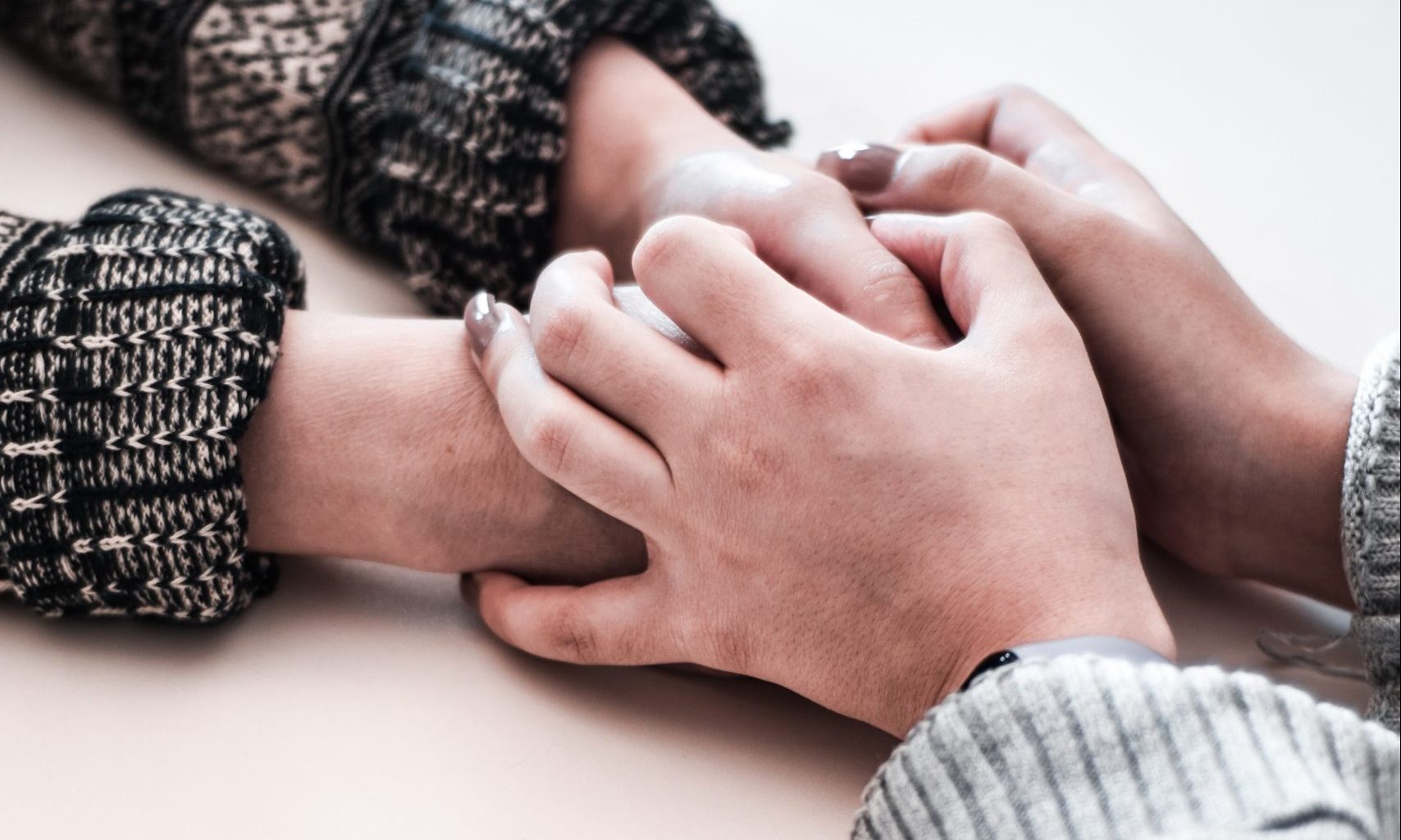Don’t say “I know how you feel”: Here’s how to be really present for someone who is grieving
Ethel Lim // August 20, 2021, 7:02 pm

We may mean well when we say things like “Don’t be sad, because your loved one is in a better place now”. But this negates the awfulness of the griever’s loss – one that is permanent and irreversible, says grief coach Gracie Mak. Photo by Zoe on Unsplash.
We often think that grief only has to do with large losses. Like the death of a loved one or a friend.
But it also has to do with the other losses that we often face in life. Such as the loss of a job, a pet, a relationship or our health. It could also include abuse, which involves the loss of trust and the loss of safety, among other things.
“Any kind of loss can cause grief.”
Then there is the Covid pandemic which has disrupted our neatly-laid schedules, our sense of order, our social lives, which has resulted in the loss of normalcy.
There are more than 40 major losses in life, according to Gracie Mak, grief coach at Whispering Hope, which specialises in journeying with people recovering from grief.
“Any kind of loss can cause grief. And if we do not acknowledge, articulate and accept the loss, we will carry that unresolved grief with us,” she tells Salt&Light.
A ball of tangled knots
Mak likens unresolved grief to “a ball of tangled wires and knots in our heads”.
“When we try to quickly undo them – without realising that it is a process that takes time – we frequently end up with an even larger mess.”
This often leads to a questioning of self and sanity, which in turn leads to loss of self-esteem and identity – another layer of loss.
“Grief is the natural reaction to loss.”
“It can sometimes be a complex and conflicting feeling,” said Mak, giving the example of a child whose abusive father has passed on.
Even when a situation resolves itself, a person may find themselves grieving.
“The child might feel a mixture of both relief and sadness.”
Even when a situation resolves itself, a person may find themselves grieving.
“Often it is tied in with a previous grief that is unresolved,” says Mak.
For instance, a client of Whispering Hope who gave birth to a child after multiple miscarriages could not understand why she was engulfed by grief during what was supposed to be a joyous time.
“As we guided her through the various losses in her life, she realised that she longed to share the happy occasion with her grandmother who had passed on just before the baby was born.
“When we uncovered this, it made so much sense. The joy was real, but it was tinged by deep grief. Both emotions were present at the same time.”
Supporting those who grieve
“We all need to learn how to grieve – to simply accept that it’s okay to grieve, to acknowledge our emotions, to articulate them, and finally, to accept our loss,” says Mak who is also is a lay pastor at New Life Community Church and a life coach.
She shares how one can allow room for grief and journey with someone in grief.
The advice given here is not meant to be a substitute for seeking professional help or counselling.
1. Give them permission to grieve
If someone is grieving, let them know it is okay to grieve – even if all they do is cry when they are with you.
Should they apologise for crying, you could say: “No apologies needed. You’re going through a lot right now. You don’t have to apologise for expressing how you feel.” By doing so, you are letting them know that it is fine for them to express their sad emotions with you.
Likewise, when you text them, do not say “I hope you are doing well”, because it places upon them the expectation that they always have to be doing well. Instead, you could ask, “How are you feeling?”
This open-ended question can open the door to more honest conversations.
The process of healing needs time. But grief will not go away with time alone.
2. Don’t claim to know how they feel
You cannot possibly know how they feel, unless you have been in the exact same situation before. And even if the situations are similar, every relationship is unique, and the emotions involved are likely to differ.
Instead, you can say with empathy, “I can’t imagine how you feel. I can’t imagine how painful this must be for you.” Truthful statements like these do not dismiss the intensity and depth of their grief.
3. Don’t be afraid to talk about the deceased
Most people avoid talking about the deceased or mentioning them by name, because they wish to avoid any uncomfortable silence and awkwardness that may arise. It is tantamount to ignoring the elephant in the room – everyone knows it is there, but no one wants to talk about it.
It hurts a griever to see their loved one “erased” as if they never existed. In talking about the deceased and mentioning them by name, we acknowledge the griever’s loss and enable them to cherish fond memories of their loved one.
4. Don’t expect them to “get on with life”
There is a great deal of pressure for grievers to “get on with it” and “get back to normal”. But that is not possible, because there is no more “normal” to go back to.
With the loss of a spouse, for instance, their favourite armchair will always be empty; family photos will look incomplete; and every festive occasion will be marred by the sense that someone is missing. The griever will have to find their footing in a new normal. Constructing what this looks like, from scratch, takes a lot of emotional work.
So if you don’t see them being their usual productive self, it is probably because all their energy is spent working through their emotions. Small steps — such as being able to get up in the morning or getting dressed to go out — can feel like big victories.
During the intense season of grief, emotions can be volatile, so a day of “feeling okay” may be followed by a few days of sobbing and deep, dark pain. Even after the griever has found a way to live with the grief, it can return in waves, especially when triggered by significant events, places or even food.
If you are supporting and journeying with someone in grief, it helps to moderate your expectations of what progress looks like.
5. Avoid dispensing clichéd advice
We may mean well when we say “Don’t be sad, because your loved one is in a better place now” or “Don’t be sad, you still have your other limb”. But this negates the awfulness of the griever’s loss – one that is permanent and irreversible.
Likewise, people who have lost a beloved pet are often told, “It was just a dog … You can always get another pet.” But a pet is not a household appliance that can simply be replaced. Pet owners often share a special bond with their pets which have unique personalities and traits.
That loss needs to be grieved over, because that special relationship was built up over time, and holds unique memories. Getting a new pet will not replace the loss.
6. Reframe what “being strong” means
For too long, we have asked grievers to “be strong”, when what we really mean is, we want them to hold in their emotions and sweep them under the carpet, because their grief makes it inconvenient and awkward for everyone else.
But that is never healthy. And what is unhealthy can never be a strength, in the true sense of the word.
Instead, reframe it and make seeking help the brave thing to do.
You could say: “It takes a lot of strength to ask for help. You are brave to want to seek help. Let me connect you with someone who can help you.”
7. Offer your presence and practical help
If your friends are showing signs of grief or isolating themselves, reach out and offer your presence. For instance, ask them out for a walk. Being out in nature can be soothing.
Offer practical help such as housekeeping, cooking or bringing meals or groceries. Or babysitting, or helping children with their homework.
8. Assure them of a God who is familiar with grief
As believers, it is natural that we want to use Scripture to comfort others, but we must take care that this does not comes across as dismissive, patronising or preachy.
The Bible does not deny the realities of life, so why should we? It is full of references to mourning, wailing and grieving. The Psalms, in particular, are full of what we would call “negative emotions”.
Grief is not incompatible with faith in a loving and sovereign God:
We have a Saviour who has been there, and done that. We have a God who understands our deepest grief:
“He was despised and rejected by men— a man of sorrows, and acquainted with grief.” (Isaiah 53:3)
The New Living Translation is even more specific. It says “deepest grief”.
It is okay to mourn and God comforts and blesses those who mourn:
“Blessed are those who mourn, for they will be comforted” (Matthew 5:4).
Grief is not incompatible with blessedness and faith. Grief does not make us any less of a believer.
God does not dismiss our grief:
“… To comfort all who mourn, and provide for those who grieve in Zion — to bestow on them a crown of beauty instead of ashes, the oil of joy instead of mourning, and a garment of praise instead of a spirit of despair.” (Isaiah 61:3)
Zion is a place of promise, but — surprise —there is also mourning there. God invites us to bring our mourning and despair to Him, so that He can transform them into a thing of beauty.
Time is allocated for weeping and grieving:
“Weeping may remain for a night, but rejoicing comes in the morning” (Psalm 30:4-5)
The God of the Bible does not expect us to hide our tears and pretend to be happy. Instead, we should express and process our grief, so we can come into a season of authentic joy.
We are not exempt from loss and grief:
“When you pass through the waters, I will be with you, and when you pass through the rivers, they will not sweep over you. When you walk through the fire, you will not be burned; the flames will not set you ablaze.” (Isaiah 43:1-2)
We don’t get to bypass the fire and flood which cause great loss. We have to go through them, but God promises to be with us through it all.
We are to grieve – with hope:
“We do not grieve like those without hope.” (1 Thessalonians 4:13-14)
If you are grieving ...
Grief can be overwhelming. When we are grieving, it is hard to see the light at the end of the tunnel.
Often our instinct is to run away from pain and grief. But grief ignored does not go away – it builds up. Only when we acknowledge our grief, can we begin to process it.
Asking for help can sometimes be the bravest thing to do. If you are suffering, reach out to friends who can bear the load with you, and seek professional help.
Where to get help
Call 999 if there is a risk of injury, immediate threat to life or bodily harm (relatives and friends of victims can call as well).
Hotlines
- Samaritans of Singapore (24-hours): Tel 1800-221-4444
- National Care Hotline (8am – 12am): Tel 1800-202-6868
Grief Recovery Specialist
- Whispering Hope (9am – 5pm): Tel 8668-2032 or click here for more information.
Using the Grief Recovery Method (which was developed in the US in the 1980s) , grief recovery specialists guide clients through a step-by-step to process their losses, and equip them with practical tools to move forward to find joy.
RELATED STORIES:
The gifts in the valley: How God shepherded a pastor’s soul after his wife died
We are an independent, non-profit organisation that relies on the generosity of our readers, such as yourself, to continue serving the kingdom. Every dollar donated goes directly back into our editorial coverage.
Would you consider partnering with us in our kingdom work by supporting us financially, either as a one-off donation, or a recurring pledge?
Support Salt&Light



